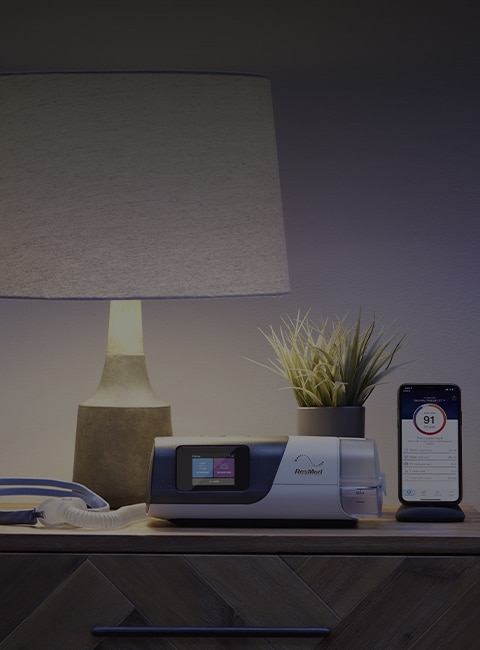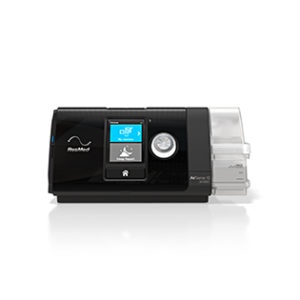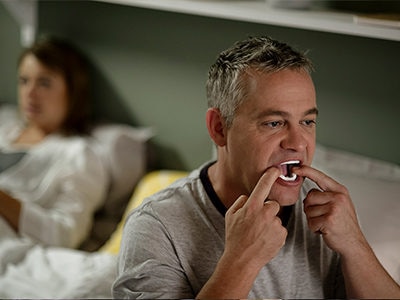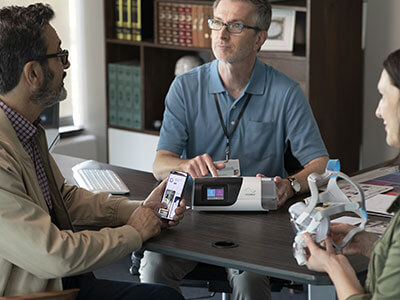Obstructive sleep apnoea treatment options

Treatment options for obstructive sleep apnoea (OSA) include three forms of positive airway pressure (PAP) therapy, oral appliance therapy, and alternative therapy.
Positive airway pressure therapy

Positive airway pressure therapy is the most effective way to treat OSA. By creating a “pneumatic splint” for the upper airway, PAP therapy prevents the soft tissues of the upper airway from narrowing and collapsing. Pressurised air is sent from a therapy device through air tubing and a mask to the upper airway.
Patients with severe sleep apnoea are able to experience restful sleep with positive airway pressure therapy. PAP therapy can be delivered in a number of ways:
- Continuous positive airway pressure (CPAP): pressurised air at one fixed pressure;
- Automatic positive airway pressure (APAP) therapy: automatically adjusted air levels based on a patient’s breathing (suited to patients with REM-related sleep apnoea, positional apnoea or those who are noncompliant with standard CPAP therapy);
- Bilevel therapy: higher inspiratory pressure and lower expiratory pressure (appropriate for certain patients who are non-compliant).
Oral appliance therapy
An oral appliance, also known as a mandibular repositioning device (MRD), is a first line treatment option for mild and moderate obstructive sleep apnoea and a second line treatment option for severe OSA. OSA patients who are non-compliant with or refuse positive airway pressure therapy often use oral appliances as an alternative therapy. Some OSA patients also prefer oral appliances because they are non-invasive, easy to wear and easy to transport.
Oral devices work by holding the lower jaw in a forward position during sleep to reduce collapse of the airway and expand space behind the tongue, which helps prevent apnoea and snoring.
Alternative treatment options
Surgery is also an option for treating obstructive sleep apnoea (OSA), though it comes with associated risks and complications. Uvulopalatopharyngoplasty (UPPP), the most commonly performed surgical procedure for OSA in the United States, is effective in reducing snoring initially. Over the long term, UPPP cures snoring in 46% to 73% of patients who have had the surgery.1
Risks of untreated OSA
Untreated obstructive sleep apnoea (OSA) can lead to a host of complications and serious health risks.
Finding the right treatment for your patient can improve compliance rates and diminish associated risks.
Keep exploring

Treatment options for snoring
ResMed has treatment options for throat snorers who have sleep apnoea, as well as for throat snorers who don’t.

Treatment options for CSA
Adaptive servo-ventilation (ASV)* is an appropriate choice for treating most of these more complex patients.

Digital health for sleep apnoea
ResMed connected solutions enable pro-active monitoring by healthcare professionals and result in more responsible patients who are involved and interested in their sleep apnoea therapy.
References:
* ASV therapy is contraindicated in patients with chronic, symptomatic heart failure (NYHA 2-4) with reduced left ventricular ejection fraction (LVEF ≤ 45%) and moderate to severe predominant central sleep apnoea.
- Kashima ML (2007). Selected disorders of the nose and throat: Epistaxis, snoring, anosmia, hoarseness, and hiccups. In NH Fiebach et al., eds., Principles of Ambulatory Medicine, 7th ed., pp. 1849–1864. Philadelphia: Lippincott Williams and Wilkins.